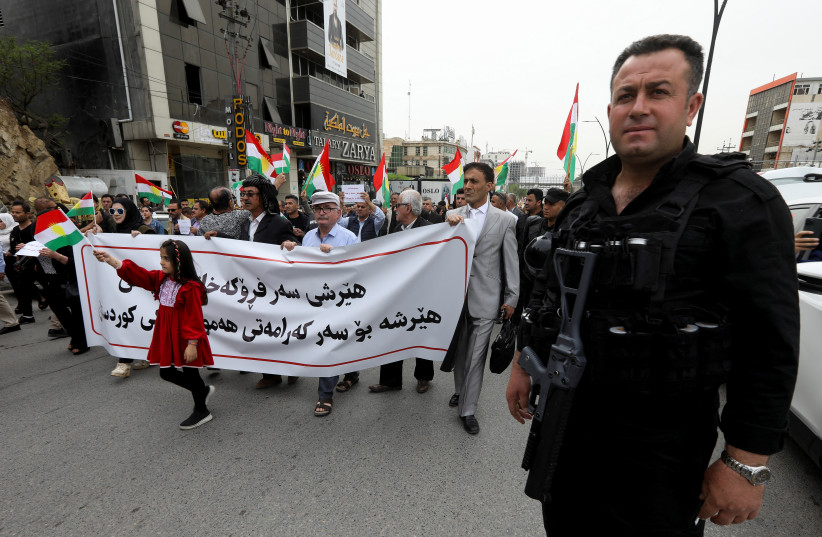A report out of Iraq’s autonomous Kurdistan Region claimed that “two unidentified drones on Monday struck Arbat Airport in Sulimaniyeh province after 4 p.m., killing seven people and injuring four others, according to Kurdistan 24 reporter Hawzhin Jamal.”
Several members of the local security forces, or Peshmerga, were killed in the strike, said the Patriotic Union of Kurdistan (PUK) party, which controls the Sulimaniyeh province.
“A large crowd surrounds the airport, and many security forces and medical teams have gathered there,” a local reporter told K24. The airport had been used for agricultural purposes until recently, when it was renovated for use by the PUK.
Iran has been threatening the Kurdish Region for months, saying it would strike Kurdish opposition groups. Some of these groups are located near Sulimaniyeh.
Iran and Turkey both have used drones for strikes in northern Iraq, while Tehran has demanded that Kurdish dissidents be removed from five specific areas in northern Iraq.

“In August, Turkish drones struck two vehicles in Sulimaniyeh province, killing three individuals and injuring two others,” Kurdistan 24 reported. Turkey recently attacked a car in Sinjar as well, targeting members of the Yazidi minority.
Meanwhile, in Erbil, the capital of the Kurdistan Region and several hours from Sulimaniyeh by car, an important delegation from Baghdad arrived recently.
“Iraq’s national security adviser arrived in Erbil as the head of a high-level delegation to ensure the implementation of a security agreement with Iran to disarm Kurdish opposition groups, state media reported, with Tehran having set September 19 as the ultimatum,” Rudaw Media Network reported.
Qasim al-Araji, the Iraqi official, arrived in the city to “follow up on the implementation of the security agreement between Iraq and Iran,” Iraqi state media reported.
Waad Qado, a member of the Iraqi parliament’s security and defense committee, on Monday said Iraq has requested an extension of the deadline, Rudaw reported.
Jeanine Hennis-Plasschaert, head of the United Nations Assistance Mission to Iraq, has also taken part in talks in Erbil regarding the Iranian demands. Iran wants five areas used by dissident Kurdish groups “dismantled,” Iranian media outlets reported.
The US also has welcomed a new budget agreement between Erbil and Baghdad. US Ambassador to Iraq Alina Romanowski on Sunday praised the efforts to come to an agreement. The agreement could help free up a budget for Erbil and also enable more energy deals in the future, she wrote.
An escalation
There is concern in the Kurdistan Region about the escalation. Pavel Talabani, who also goes by the name Bafel, said the targeting of Arbat was a “flagrant violation of the borders” of the Kurdistan Region and Iraq. He condemned it as a terrorist attack and said it led to “the martyrdom and injury of six Peshmerga heroes fighting terrorism in Kurdistan.”
In Iran, a drone crashed in the northern city of Gorgan. There was apparently no connection with the incidents in Iraq.
The movements in northern Iraq are important for regional security. Iran is trying to suppress dissent around the region via a mix of diplomatic outreach and military threats. For instance, Iran has continued to pressure the US to leave Syria.
Iran also threatens Israel. It threatens the Kurdistan Region because it wants to have greater control over Iraq. Many Kurdish Iranians have fled Iran to Kurdish areas in northern Iraq. Iran wants to control or silence them via the threats noted above.
